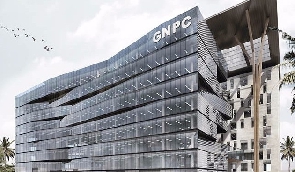The Chairman of the Public Interest and Accountability Committee (PIAC), Nobel Wadzah, has observed that the functions of the Ghana National Petroleum Corporation (GNPC) and the Petroleum Commission are conflicting, hence the need to clearly define the mandates of these two state institutions.
Mr Wadzah called for a review of GNPC Law 1983 (PNDCL 64), the law that stipulates the functions of the two institutions, in order to make their functions clear with regard to their regulatory responsibilities.
He believes that the regulatory duty should be left to the Petroleum Commission while the commercial activities are left to the GNPC.
At the moment, he said both institutions seem to be performing the same functions.
GNPC Law 1983 (PNDCL 64) mandates the Ghana National Petroleum Corporation to “undertake exploration, development production and disposal of petroleum…” and also perform some regulatory functions such as “promote the exploration and the orderly and planned development of the petroleum resources of Ghana, ensure that petroleum operations are conducted in such manner as to prevent adverse effects on the environment, resources and the people of Ghana”
Speaking on the sidelines of a presentation of PIAC’s 2019 mid-year report on Management and Use of Petroleum Revenues, Mr Wadzah maintained that GNPC should be limited to petroleum commercial activities and the regulatory functions left to the Petroleum Commission.
“Going into oil in 2007, it became necessary we decouple the activities of the National Oil Company from regulatory functions for which reasons Petroleum Commission was established”, he noted.
He believed that a review of the law will be a “way to reduce institutional conflict and possible turf war. It is important that we review GNPC’s mandate now that we look at GNPC from a commercial lens”
From PIAC’s perspective, if the GNPC is limited to operating as a commercial entity, then it can stand in competition with other oil commercial entities for which it is called a National Oil Company.
He said: “…And I think if we are able to clean out what we see as inconsistences, GNPC, as an NOC, then it has a full leverage to behave like a strong commercial entity just as we see the ENI and the rest do in the world and veer off other fields outside the jurisdiction of Ghana and bring us the cash”.
“We need to know where GNPC lies in terms of its corporate activity. Is it a private sector? Are they making profit? Where do they stand? This way of always giving them money is unworthy and I think this is part of PIAC’s worry”.
The GNPC is the anchor partner in upstream petroleum operations in Ghana, and is currently in 17 joint venture partnerships with international players over 17 oil blocks. It is also currently pioneering exploration works in the onshore Voltaian Basin, the largest sedimentary basin of Ghana, covering 103,600 kilometres.
Business News of Wednesday, 11 March 2020
Source: classfmonline.com













